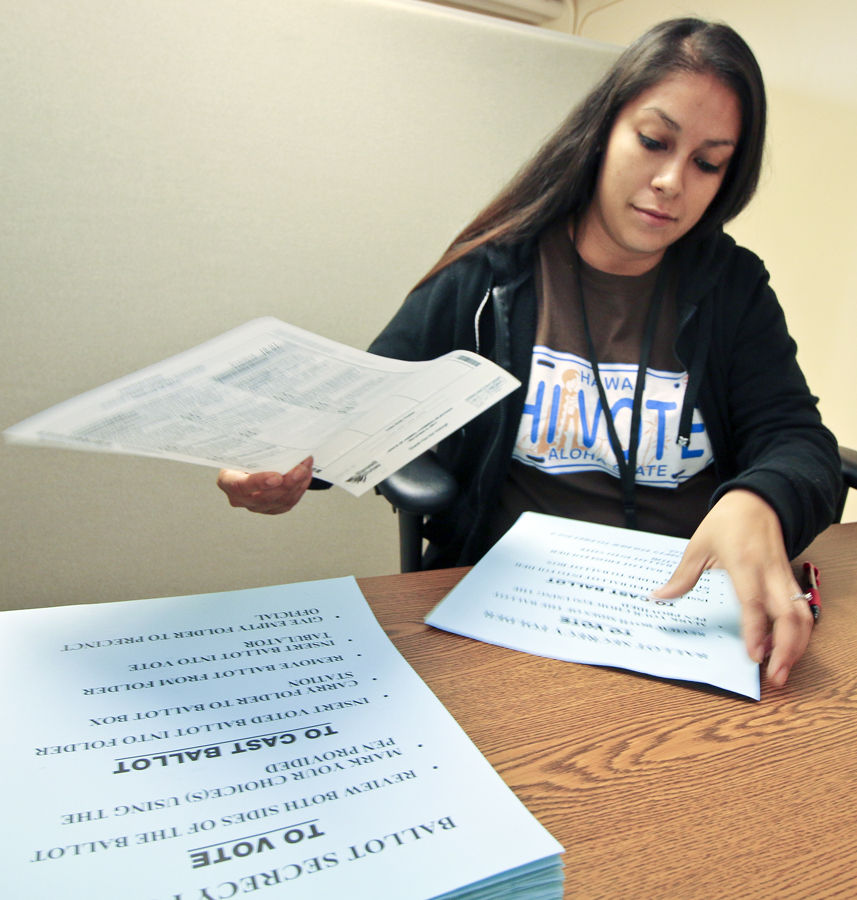LIHUE — Aloha and apathy.
Hawaii landed at the bottom of a list by an agency that recently ranked each state in political engagement, and that’s not surprising to some Kauai residents.
Sharon Kojima of Kapaa said she has no intention of casting a ballot in the general election on Tuesday. She doesn’t know enough about the candidates, she said, and doesn’t feel like she’s alone.
“People aren’t interested in the issues being presented,” she said. “There is a lot of information on all the issues, but it’s a matter of getting people interested enough to make the effort of voting.”
WalletHub’s 2014 analysis looked at the percentage of registered voters and voter turnouts in recent elections, and the islands ranked as the third-least engaged, which doesn’t bode so well with Election Day approaching.
Hawaii was dead last —51st, including the District of Columbia — in the percent of registered voters in the 2012 presidential election. When it came to total political contributions per adult population, Hawaii finished 13th.
While the national personal finance social network agency didn’t provide reasons why certain states flocked to the polls over others, some around Kauai offered their thoughts on why Hawaii might be so low. They varied from non-citizens comprising much of the population to a one-party stranglehold disenfranchising voters to sheer boredom with the issues.
Kekaha resident Nukoon Lupkes said it’s likely a lot of people just aren’t legally eligible to cast a ballot.
“A lot of people aren’t citizens,” she said, adding that she plans to vote on Tuesday, along with her husband, who is more in tune with the issues. “They can’t vote. We have a lot of those here.”
A self-described Independent, Jim Whitfield of Lihue said the results didn’t surprise him and it’s been that way the 13 years he’s lived here. It doesn’t discourage him, however, from his civic duty.
“Because we have a one-party state and people kind of accept things as they are and so people don’t get too energized by the elections,” said Whitfield, who already voted this year. “After the Democrats have taken care of who they’re going to throw out there, people feel OK, it’s a done deal, so why bother anymore.
“There are some candidates I feel that are worth supporting and I don’t like the idea of a one-party state so I like to give a little support to the outsiders,” he said.
While the report didn’t offer specific reasons behind the rankings, it pointed out that the depth of one’s pockets is an important factor in both voter turnout and public policy. During the 2008 presidential election, for example, only 41 percent of eligible voters making less than $15,000 a year voted, compared to 78 percent of those making $150,000 a year or more.
Several people said the issues are just not interesting or important enough in their lives.
Casey Soares has lived on island 34 years and only votes for presidents. She doesn’t pay attention to local issues, although her husband votes, and when her friends talk about local politics, she doesn’t pay attention.
“I’ve got my kids,” she said, adding she’s busy raising a family.
That’s something Kevin Acob of Hanapepe hears often when he’s trying to register people to vote.
“I’m finding out that people feel it’s not important,” he said. “I tell them it’s important to vote because if you don’t vote, you can’t complain.”
Hawaii’s not alone with low engagement. The study was launched because only 15 percent of eligible voters cast ballots at the first 25 of this year’s state primaries and downward voting trends have been the norm over the past 50 years.
Others couldn’t put their finger on why Hawaii’s so low, but shot out some guesses.
“I don’t know why people don’t go out to vote. Is it laziness?” said Lance Ijima of Kapaa. “Is it because they don’t want to be, or aren’t, educated on the issues? I don’t really know.”
Conversely, Kauai posted its highest voter turnout in 12 years during the August primary.
In all, 47 percent of registered voters on Kauai and Niihau, or 19,366 people, cast ballots, the highest percentage in the state.
Fred Zollinger of Lawai plans on voting. He didn’t know why Hawaii was so low, but had a potential solution to fix participation: punishment.
“People don’t vote because we don’t have a fine for not voting,” he said. “The fine for not voting should be a percentage of a person’s income. In Australia, and some other countries, they have fines for not voting — now, that’s true democracy.”
Tom Hasslinger, managing editor, can be reached at 245-0427 or thasslinger@thegardenisland.com.
Dennis Fujimoto, staff writer and photographer, can be reached at 245-0453 or dfujimoto@thegardenisland.com.





